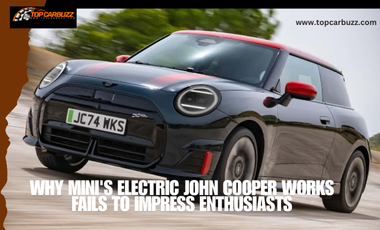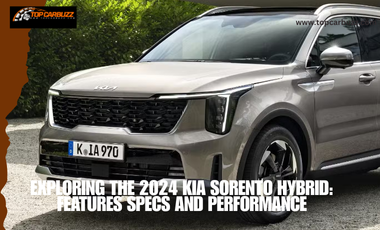The Mini brand has always held a special place in the hearts of car enthusiasts. Known for its quirky design, go-kart-like handling, and rich history, Mini has managed to remain relevant across decades. Yet, as the auto industry shifts toward electrification, not all of Mini’s fans are thrilled with its latest venture—the Electric John Cooper Works (JCW). Despite promising a new era of performance, the electric JCW has received a mixed reception, especially among purists and driving enthusiasts.
The Soul of JCW: Performance Expectations vs. Reality
Driving enthusiasts often associate the John Cooper Works badge with a raw, dynamic driving experience. Petrol-powered JCW models have delivered punchy acceleration, sharp cornering, and an engaging exhaust note, making them popular choices for those who appreciate spirited drives. When Mini announced an electric version of the JCW, expectations were high, with many hoping for a seamless blend of eco-friendliness and performance.
- The Weight Problem: The transition to electric power inevitably means adding a large battery, and this has made the electric JCW heavier than its gasoline-powered siblings. This additional weight dampens the agile feel that has traditionally defined the JCW lineup. While the instant torque from the electric motor provides quick bursts of acceleration, the extra weight affects cornering dynamics and overall driving agility. Enthusiasts have pointed out that the car feels less nimble and lacks the signature “flickability” of earlier JCWs.
- Lack of Engaging Sound: A major part of the JCW experience has always been the sound—whether it’s the crackles and pops from the exhaust or the growl of the turbocharged engine. The electric JCW, being almost silent, lacks this aural excitement. Some fans appreciate the quieter ride, but many miss the auditory feedback that makes each drive feel special. The absence of engine noise takes away from the visceral thrill that made the JCW brand stand out in the first place.
Range and Charging: Practicality Meets Disappointment
Electric vehicles often face scrutiny when it comes to range and charging times, and the electric JCW is no exception. While city driving can be enjoyable in this compact EV, its limitations become more apparent during longer trips or spirited drives.
- Range Anxiety: Many enthusiasts value the ability to take their cars on road trips or extended drives without having to frequently stop for fuel. The electric JCW, with a range that falls short of competitors, struggles to meet these expectations. A full charge may only deliver around 150-200 miles, depending on driving style and conditions, which can be limiting for those who enjoy extended driving sessions. This range can shrink even further when the car is driven hard, a significant drawback for those who expect their JCW to handle more than just city commutes.
- Charging Infrastructure: While the public charging infrastructure is improving, it’s still not as widespread or convenient as gas stations. For enthusiasts who enjoy spontaneous drives, the need to plan charging stops can feel like an inconvenience. Even with fast-charging capabilities, the time spent waiting for the battery to recharge can dampen the excitement of taking the JCW out for a spirited spin.
Handling and Driving Dynamics: Missing the Go-Kart Feel
The traditional charm of a Mini lies in its go-kart-like driving experience, where the car feels connected to the driver and the road. This handling prowess has always been a hallmark of the JCW badge, offering a fun and engaging drive on twisty roads and city streets alike.
- Steering Feedback and Response: One of the criticisms aimed at the electric JCW is its lack of steering feedback. While the electric power steering is precise, it doesn’t provide the same level of communication between driver and road that petrol-powered versions offer. The heavy battery pack shifts the weight distribution, and despite attempts to balance the chassis, the car doesn’t feel as responsive when pushed to its limits.
- Braking Regeneration: Electric vehicles often feature regenerative braking to help recharge the battery during deceleration, and the JCW is no different. This regenerative braking can make the driving experience feel inconsistent, especially during aggressive driving. Enthusiasts who are used to the sharp, predictable braking of traditional JCWs may find this aspect of the electric model less satisfying.
Price vs. Performance: A Tough Pill to Swallow
Another factor that has kept some Mini enthusiasts from embracing the electric JCW is the price tag. Positioned as a high-end performance vehicle, the electric JCW commands a premium price, but some argue that it doesn’t deliver enough thrills to justify the cost.
- Premium Pricing: Despite the electric powertrain, the JCW’s pricing is closer to that of high-performance petrol models, but without the driving experience that typically accompanies the price. Enthusiasts who are willing to spend top dollar often expect top-tier performance, but the electric JCW doesn’t quite hit the mark in that department. Many would prefer a traditional petrol-powered JCW or even consider other electric vehicles that offer a more engaging drive.
- Value Proposition: For the same price, other electric cars offer more range, better acceleration, or more luxurious interiors. This makes it hard for the electric JCW to stand out. Enthusiasts who are seeking a sporty, electric experience may feel that their money would be better spent elsewhere, especially when they can get a more engaging drive from a vehicle that doesn’t carry the same weight penalty.
What Enthusiasts Are Saying
The reaction from the car community has been mixed, with some appreciating Mini’s effort to modernize while others feel the brand has lost its way. Social media and car forums are filled with debates about whether the electric JCW can truly be considered a successor to the models that came before it.
- Loyalists’ Disappointment: Longtime fans of the JCW brand argue that the electric version lacks the soul that made previous models special. They miss the aggressive power delivery and the sense of connection with the road. Some have gone as far as to say that the electric model feels more like a regular EV with a JCW badge than a true performance vehicle.
- New Fans Appreciate the Quiet Ride: On the other hand, some drivers enjoy the blend of Mini’s compact size with the quiet and smooth power delivery of an electric vehicle. They see the electric JCW as a modern interpretation of the brand, suited for urban driving and those who want to reduce their carbon footprint without sacrificing style.
Frequently Asked Questions (FAQ)
Q: How does the acceleration of the electric JCW compare to the petrol version?
The electric JCW offers a quick burst of acceleration due to the instant torque from its electric motor, but it struggles to match the outright power and top-end speed of the petrol-powered JCW models. The heavier weight of the battery also impacts its agility during fast cornering.
Q: What is the driving range of the electric John Cooper Works?
The electric JCW typically offers a range of about 150-200 miles on a full charge, depending on driving conditions. Harder driving or spirited performance can reduce the range significantly, making it less ideal for long-distance trips.
Q: Does the electric JCW retain the famous go-kart feel of the petrol models?
While Mini has tried to maintain the sporty character, the extra weight from the battery pack and the different power delivery make the electric JCW feel less agile than its petrol counterparts. It still handles well, but the light, responsive feel has been somewhat compromised.
Q: Why is the electric JCW more expensive than the petrol version?
The higher cost of the electric JCW is due to the advanced battery technology and electric powertrain. Additionally, it comes with various features and design elements aimed at making it a premium product. However, some enthusiasts feel that the price doesn’t fully align with the driving experience provided.
Q: Is the electric JCW a good choice for daily commuting?
For urban drivers who prioritize a quiet, smooth ride and appreciate the styling of the JCW brand, the electric version can be a good daily driver. Its compact size and eco-friendly powertrain make it well-suited for city environments. However, those seeking high-performance thrills may find it lacking compared to traditional models.
The Electric John Cooper Works has undoubtedly brought something new to the table, but for enthusiasts, it doesn’t quite deliver the raw, engaging experience that many have come to expect from the JCW badge. It’s a step forward for the brand, but perhaps not the leap that some were hoping for.



